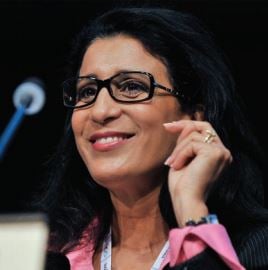Search the latest and greatest job opportunities in sport

First published on LEADERS Magazine
A passion for change
Nawal El Moutawakel is the first Muslim female born on the African continent to become an Olympic champion. In 1984, she won for the inaugural 400-meter hurdles at the Los Angeles Summer Olympics, a breakthrough example for all sporting women in Morocco and other mostly Muslim countries. Today, she is an executive board member on the International Olympic Committee.
She credits her parents with instilling in her a love of sports at an early age. Both practiced what they preached – her mother was a volleyball player and her father trained in Judo. “They played a major role in shaping my personality and my dreams by speaking to me about the true value of sport on a daily basis and by attending my training sessions and competitions on the weekends,” she says.
In addition, she notes the importance of her “amazing coaches” who had faith in her at the club level, at Morocco’s National Federation, and finally at the university level – these were all key elements in pushing her towards excellence. It was her acceptance of a Title IX scholarship at Iowa State University that gave her the chance to indirectly advance the lives of many girls and women in the U.S. and elsewhere through sports. Also, she notes, the Flo Hyman Award bestowed on her in 2003 by the late Senator Ted Stevens on behalf of the Women’s Sports Foundation and her induction into the Hall of Fame “empowered me to continue my aim of gender equality in sports, to push for the retention of young girls in sports programs, and to encourage education concerning the importance of physical activity and living a healthy lifestyle.”
On equal footing
Nawal is a strong advocate of Title IX and believes many countries would benefit from U.S. experience by introducing a law that forbids sex discrimination. “In many other parts of the world, girls and women are not afforded the same opportunities as boys and men,” she says. “In sports, this disparity is very pronounced in the lack of girls’ participation in athletics in schools, youth centers, and sports clubs. Sports are one of the best tools for social change because they are a large part of culture around the world and reach into every socioeconomic class of society.”
If laws are put in place, she is certain the benefits will be beyond measure. “Sports help develop self-esteem and confidence, improve physical and mental well-being, serve as a medium of communication, and empower women to improve themselves and their communities.”
Where does her passion for change come from? Nawal looks at stereotypes, taboos, gender discrimination, and prejudice if she needs to get fired up. She also draws great encouragement from the victories and changes she sees as more girls and women around the world get the opportunity to feel the team spirit, perform, and succeed.
According to Nawal, “Now in addition to Moroccan women, Arab and Muslim women are breaking records and competing in international sporting competitions. I was happy to finally see that during the 2012 London Games, two women from Saudi Arabia, four from Qatar, and one from Brunei Darussalam participated for the first time ever.”
Nawal El Moutawakel won the inaugural 400-meter hurdles during the 1984 Los Angeles Olympics and made history as the first Moroccan and the first African-Muslim woman to capture an Olympic gold medal. Nawal became Morocco’s first woman Minister of Sport. Having helped generations of young girls and women transcend thousands of years of traditional barriers, she emerged as a powerful and popular sports leader. She currently holds positions on the International Association of Athletics Federations and most recently was elected Vice President of the International Olympic Committee (IOC).
Copyright © 2013 LEADERS Magazine, Inc.
Search the latest and greatest job opportunities in sport